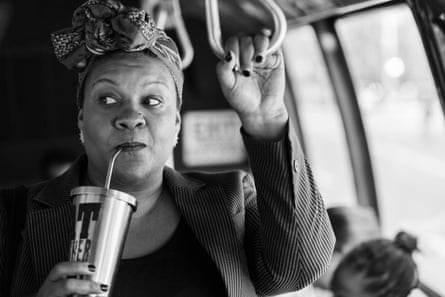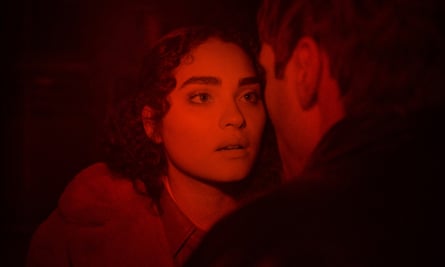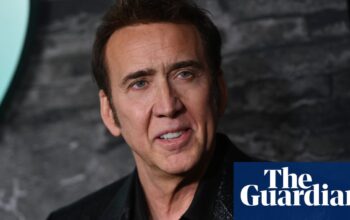The list of hip-hop acts who have starred in their own biopic is a short one, and it has perhaps its unlikeliest entry in Kneecap. The spiky Belfast trio’s pro-republican protest rap – much of it pointedly in the Irish language – has made them cult figures on home turf, and comedian turned film-maker Rich Peppiatt’s ebullient film, simply titled Kneecap, aims to do the same internationally. Avoiding a lot of self-important biographical tropes as it depicts their scrappy rise to fame and lays out their blunt political principles, it could easily be mistaken for fiction, with its knockabout tone and heightened comedy, though that just helps it as a mythmaking exercise. As in much of rap culture, being a little larger than life is the point.
In the ranks of hip-hop cinema, Kneecap is certainly sui generis – as is the band itself – though its emphasis on hard-up roots and streetwise authenticity of voice still put it in line with more conventional examples of the genre. Textured and empathetic, Curtis Hanson’s 2002 film 8 Mile exercised considerable less humour in lightly fictionalising the Detroit trailer-park beginnings of rap star Eminem, who plays a version of himself (here dubbed “B-Rabbit”) with rather more grit and humanity than anyone might have expected at the time, steering the film out of vanity-project territory. His protege Curtis “50 Cent” Jackson wasn’t nearly so lucky in his own thinly disguised semi-biopic, Get Rich or Die Tryin’, improbably directed by Jim Sheridan, which was all blank macho posturing and steely brand management.

A decade later, hip-hop got the more standard prestige biopic treatment with Straight Outta Compton, an absorbing, well-acted chronicle of NWA’s rise and eventual disintegration in the late 80s and early 90s – though it lacked the edge and dynamism of the groundbreaking group it portrayed. Hip-hop biopics can be more playful when dealing with subjects who aren’t household names. Roxanne Roxanne (Netflix) is a lively, propulsive portrait of trailblazing but oft-overlooked female rapper Roxanne Shante that has something of her music’s rude wit and bounce, while the documentary Bobi Wine: The People’s President (Disney+) engagingly examines Ugandan singer-rapper Bobi Wine’s shift from protest musician to actual politician.
Hip-hop movies often capture the thrill and pulse of the music most effectively when they work in outright fiction. Bassam Tariq created a new classic of the genre – and certainly a British peak – with Mogul Mowgli, making good on the musical credentials of co-writer and star Riz Ahmed, positively electric as a British-Pakistani rapper living with an autoimmune disease. Terrence Howard and Taraji P Henson made a name for themselves in Hustle & Flow, a story of a Memphis pimp and aspiring rapper that covered a somewhat cornily moralistic tale with sweaty atmosphere, strong performances and an on-point soundtrack.

In what remains a male-dominated genre, a few female rapper portraits have addressed that imbalance in recent years – notably Geremy Jasper’s Patti Cake$, a winning portrait of a hard-bitten white New Jersey bartender with blingy hip-hop dreams, and The 40-Year-Old Version (Netflix), in which Radha Blank vibrantly riffs on her own life in a story of a despondent playwright turning to rap as middle age looms. Moroccan film-maker Nabil Ayouch’s fluorescent pavement musical Casablanca Beats, meanwhile, invites everyone to the party in its uplifting portrayal of a ragtag group of Casablanca teens uniting to form a socially conscious rap collective under the slogan “You have to change it because you didn’t choose it”. Kneecap could borrow that, translated into Irish of course.
All titles in bold are widely available to stream unless otherwise specified.
Also new on streaming
It’s What’s Inside
(Netflix) In the biggest deal of Sundance, Netflix paid a whopping $17m for Greg Jardin’s clever, high-concept horror comedy – in which a group of former college friends are torn asunder by a mysterious body-swap device – only to bypass a cinematic release entirely. It doesn’t dig that deep into its smart premise, but deserved to be a bigger crowdpleaser.

Close to You
Elliot Page’s compelling, heart-on-sleeve performance as a trans man negotiating a brittle reunion with his estranged family is the whole raison d’être of this affecting but slightly pastel-shaded drama from celebrated British TV director Dominic Savage.
Twisters
Not so much a sequel to the 1996 disaster-movie smash as a very efficient rehash of its most nail-biting hurricane set pieces, Lee Isaac Chung’s film will suffer more than most of this summer’s blockbusters in its transition to home viewing, but is fun just the same.
Source: theguardian.com


